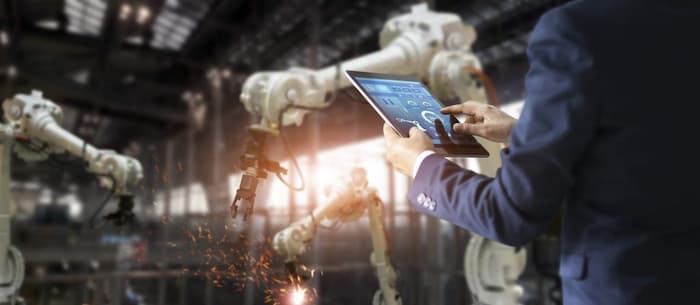News and Events
The robotics industry is constantly changing and evolving. New robotics technologies and developments in automation are quickly creating exciting career opportunities at every education level – from micro-credentials to PhDs. Here is where you can learn more about robotics careers in manufacturing and how these new technologies are benefiting workers


NEWS
Do Robots Have a Role in the Military?
July 6, 2021If you’ve been following along with our blogs, you’ve seen that we spend a lot of time talking about robots in manufacturing. That’s not surprising–manufacturing is literally in our organization’s name! But no discussion about robotic implementations would be comprehensive without looking at how many robotics technologies that we use in the civilian space got their start with military applications.
What Are Military Robots Good For?
As anybody who’s ever served in the military will tell you, there are a lot of things soldiers do that have nothing to do with using a weapon. These are some of the main reasons why robots might be a better choice than a person.
Robots are Expendable
Military robots can be expensive, but that expense is nothing compared to the value of human life. If a robot can take on the risk in place of a human soldier, everybody wins. Because of that expendability, robots are often deployed in many situations that are dangerous to humans. It’s also true that we rely on our military to handle multiple varieties of danger that aren’t on the battlefield, from disaster recovery to humanitarian crises. Robots are useful replacements for humans when the danger is high.
For instance, military robots are useful in the extremely dangerous task of clearing minefields. A robot can find, detonate, and dispose of land mines that would otherwise be deadly dangers to humans. The supply of robots is infinite, but humans are irreplaceable.
ARM Member Re2 Robotics has created robots for military use not just for helping to clear ordnance but in other applications that can be easily adapted to civilian use. The Re2 Sapien Sea Class, for example, is an advanced robot system used in underwater deployments.
Robots are Tougher
Since robots tend to be made out of metal, carbon fiber, or other cutting-edge materials, they also tend to be more resistant to damage than flesh-and-blood human beings. This makes them useful for far longer than a human equivalent. A human being needs three hots and a cot (military slang for something to eat and a place to sleep), but a military robot needs none of those things.
Robots Can Do Things Humans Can’t Do
An excellent example of how valuable robots can be in military applications is the use of robots as “guard dogs.” Robots of this kind don’t sleep, don’t get distracted, don’t get bored, or any of the million other factors complicating a human’s role as a guard (or sentry, in military parlance).
It’s not just about those things that robots don’t have to contend with but also things that robots can do. Artificial intelligence combined with advanced imaging capabilities allows robots to see in spectrums and make deductions that humans can’t. While a human can strap on some night vision goggles, they can only use one at a time. A robot can see in multiple ways and multiple spectrums simultaneously, processing every frame of video and every microsecond of audio for clues and patterns invisible to people.
The Human in the Loop
While robots are useful for many applications, including military ones, every implementation includes a human being (usually several). Robots can do a lot of different things, but humans are needed at every step, from building to maintaining to programming to overseeing.
At RoboticsCareer.org, you can find local robotics programs that will get you started on the path to your own career, whether it’s as a robotics technician, a specialist, or an integrator. These jobs are important for the civilian workforce but also apply to military personnel.
Begin your search today and discover an exciting future in robotics!


